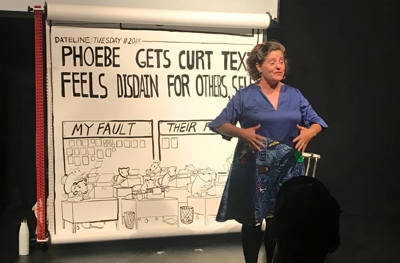‘A sea turtle mom crawls up on a beach, digs a hole, and lays her eggs. And then she leaves,” says Phoebe Potts, doing a remarkable impression of a sea turtle’s expression and subsequent getaway.
“Nature doesn’t care who the mother is or what she does. Nature doesn’t judge,” says Potts.
In contrast, as Potts experienced and explains, judgment abounds on the route to human parenthood, including in bizarrely arbitrary ways when trying to adopt.
For five days next week, Wednesday-Sunday, April 9-13, Phoebe Potts is on stage at Lost Nation Theater with her original solo “Too Fat for China,” launching Montpelier’s resident professional theater company’s 2025 mainstage season at City Hall Arts Center.
True to its subtitle “A Comic Look at the Agony of Adoption,” Potts’ story centers on her quest for a child. The play is thoughtful, tender, and hilarious — often all at once.
“Too Fat for China,” Potts’ first play, was winner of the “Best Storytelling” award in 2023 at New York’s United Solo Festival. Beside New England performances, she performed it at the Edinburgh Fringe Festival in 2022.
Onstage, Potts is accompanied by her 6-foot-tall “crankie,” a device taller than she is that holds a scroll with her cartoon-like illustrations.
“Phoebe is a visual artist, she’s a writer, and she’s an amazing performer. In this show she uses all her skills. It’s almost like if your favorite cartoonist was also a performer,” said Kim Bent, Lost Nation Theater’s founding artistic director.
“Phoebe had this really intense experience of wanting to adopt a child and having a very complex journey to accomplish that. She wraps it all up in a very entertaining way,” said
Bent, noting Potts’ similarities with Lily Tomlin and Whoopi Goldberg who masterfully incorporate their personal experiences in their humor.
“It is that journey of an artist from the personal to the universal — taking her own personal experience and making it something that everybody can relate to and be inspired by,” said Bent.
Potts lives in Gloucester, Massachusetts, where, beside writing, drawing, and touring the play, she is writer in residence at Endicott College. A longtime educator, she has taught at her synagogue’s Hebrew school for two decades.
“Too Fat for China” follows Potts’ extensive storytelling performances at Gloucester Stage’s Fish Tales series and her graphic memoir, “Good Eggs” published in 2010. “Good Eggs,” in Potts’ cartoon like panels, deals with Potts and her husband’s quest for parenthood in the face of inability to get, or stay, pregnant.
Potts’ “crankie” incorporates her visual arts in the show. The “crankie” is her custom version of entertainment devices popular in the 1800s, then called “moving panoramas.” Its scroll is a bit like a giant turning comic book, whose pages are sequentially revealed. Potts’ scroll also connects to Judaism’s Torah scroll, inscribed with the Five Books of Moses.
Her story begins with Potts’ Jewish Brooklyn youth and life lessons rooted there. That background also contributes to the newsroom in her head. The newsroom speaks up frequently, adding commentary via the crankie.
Potts and her husband’s path to parenthood was circuitous. Thoughtful and self-reflecting, she unflinchingly deals with big issues around adoption — domestic and international — and is frank about the rapaciousness of the adoption business.
She observes that “every adoption starts with a tragedy.”
As Potts deals with capitalism, race, religion, sea turtles and more, she is smart and kind and funny. She brings the audience along through her experiences and discoveries — from her unfiltered response during social worker home interviews to discovering unexpected criteria, including China’s prohibition of adoption by prospective parents with a Body Mass Index (BMI) over 29.
Potts, who notes that she “looks like a furry after-school pottery teacher from Brooklyn,” tipped the scale just over that.
Potts and her husband’s navigation of the twisting road to adoption runs through the play, but it is a far bigger story than just how they got a baby. She has beautifully crafted it to deal with social, political and moral questions, and be very funny and touching at the same time.
Lost Nation Theater’s 2025 season is focused on “telling stories that restore us. Phoebe’s story certainly does that. It gives us hope. It gives us a reason to get up in the morning and get out there and fight the good fight,” said Bent.


